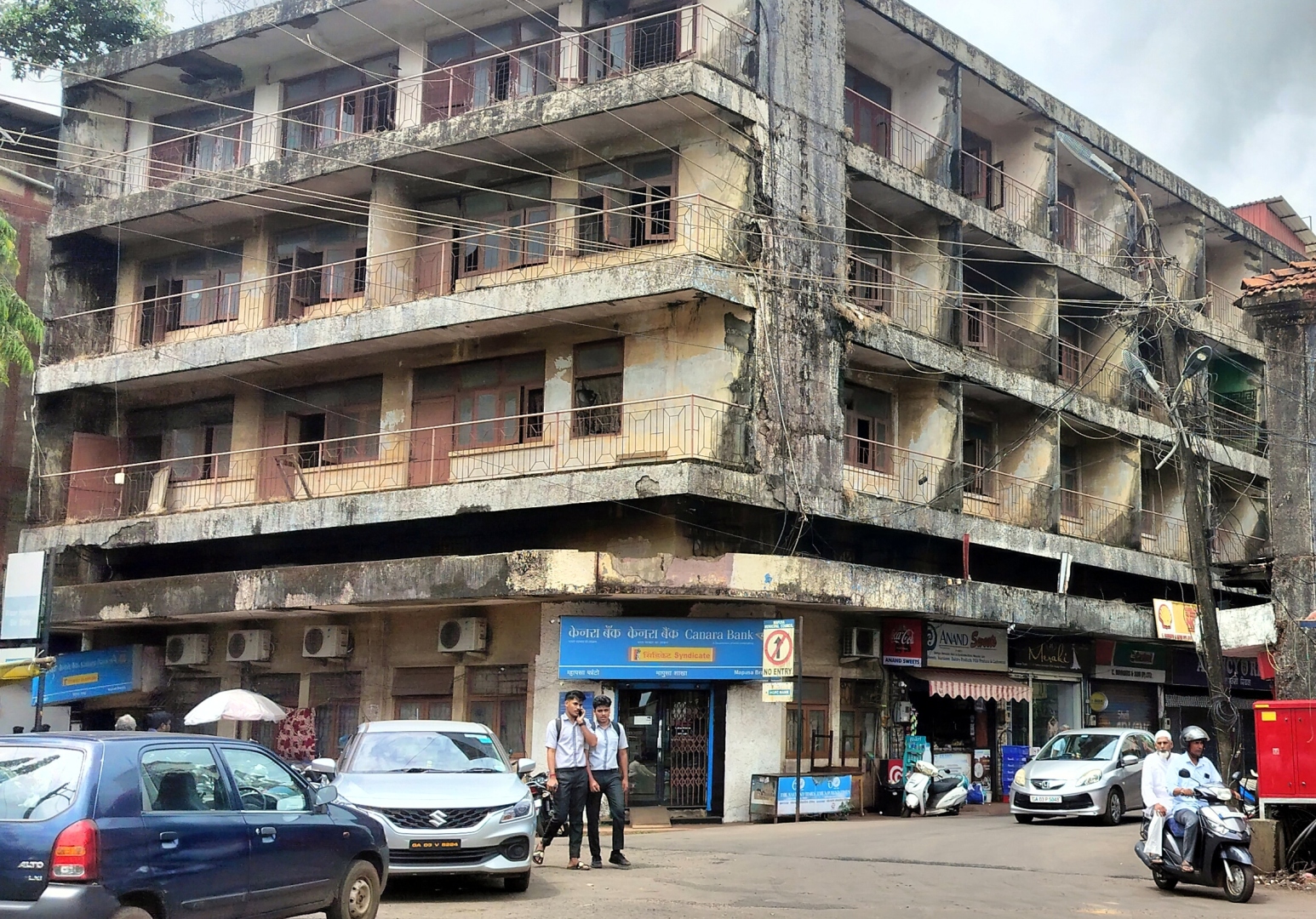
MAPUSA
The Mapusa Municipal Council (MMC) may have recently acted by demolishing a dangerously dilapidated ancestral house at Ansabhat and sealing the crumbling Junta Quarters in the old market area, but several other buildings across the town remain in a precarious state and are at risk of collapse.
Two separate incidents – a leaking government complex and the collapse of a concrete balcony near the vegetable market – have raised serious concerns about the state of public and private infrastructure, calling for urgent attention and systemic reform.
The first incident involved the government complex that houses several key administrative departments. Water leakage from the roof and visible cracks on the walls have exposed the deteriorating condition of this vital public facility, frequented daily by hundreds of citizens. While no injuries were reported, the episode has drawn attention to the vulnerability of even state-owned structures.
Soon after, panic gripped the area near the Mapusa vegetable market when large chunks of concrete from a building’s balcony came crashing down. Though no one was hurt, the incident served as a grim reminder of the structural vulnerabilities in one of the town’s busiest commercial areas.
These are far from isolated cases. In recent years, Mapusa has seen multiple near-tragic collapses: In 2024 a section of the dilapidated Koskar-Kesarkar building’s slab gave way, narrowly avoiding casualties. Similarly, in 2019 a century-old building along Feira Alta State Highway collapsed during the monsoon, miraculously causing no injuries as it occurred late at night.
These events reveal a persistent pattern of structural neglect, poor maintenance, and inadequate preventive action – even when authorities are well aware of the risks. Notably, neither of these buildings was on the official list of unsafe structures – an oversight that underscores larger deficiencies in inspection, maintenance and accountability.
At least a dozen multi-storied buildings, some housing commercial establishments and government staff, remain in a perilous condition and need urgent attention before disaster strikes. Sources within the MMC reveal that there are at least 20 other structures – many of them prominent buildings – deemed unsafe and overdue for either repairs or demolition.
Among them are: Dempo Mansion, home to a nationalised bank, Vaz Corner at Tali-vaddo, Ganga Apartments at Feira Alta, Junta Quarters behind Alankar Theatre, Hotel Safari, opposite the old municipal building, Karekar Building, near the Laxmi Narayan Temple, old Fajanta building, Feira Alta, a private house near Remanso Hospital and Asilo Quarters at St Sebastian Vaddo, which still house hospital staff despite deteriorating conditions.
Surprisingly, even some government buildings, such as the one housing the electricity department, have been declared unsafe yet remain operational –endangering both staff and the public.
Barriers to action
One of the key impediments to resolving this issue is the legal and logistical deadlock between landlords and tenants. In many cases, landlords are ready to redevelop or demolish ageing properties. But tenants – fearing eviction, loss of income or simply refusing change – often resist vacating the premises. These disputes routinely land in court, stalling action for years. In the meantime, the buildings continue to decay, turning into accident zones in waiting.
MMC Chairperson Priya Mishal had assured that a number of dilapidated buildings have been identified for action, but actual demolition will only proceed once formal approval is received from the North Goa Collector. The municipal council typically issues notices to building owners urging repairs or demolition, but compliance is rare. As a temporary measure, MMC has resorted to sealing off hazardous buildings, though this only addresses the symptoms, not the root causes.
The way forward
The spate of recent incidents underscores the urgent need for a comprehensive policy response. Preventive maintenance, clear protocols for tenant-landlord disputes, quicker legal processes and consistent monitoring of building safety must be prioritised. Ultimately, safeguarding public safety in Mapusa will require coordination between the municipal council, building owners, tenants and State authorities. Failure to act decisively could turn near-misses into tragedies, further eroding public trust and risking lives in a town already living on borrowed structural time.